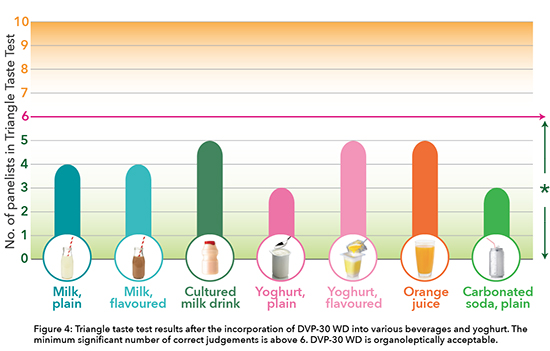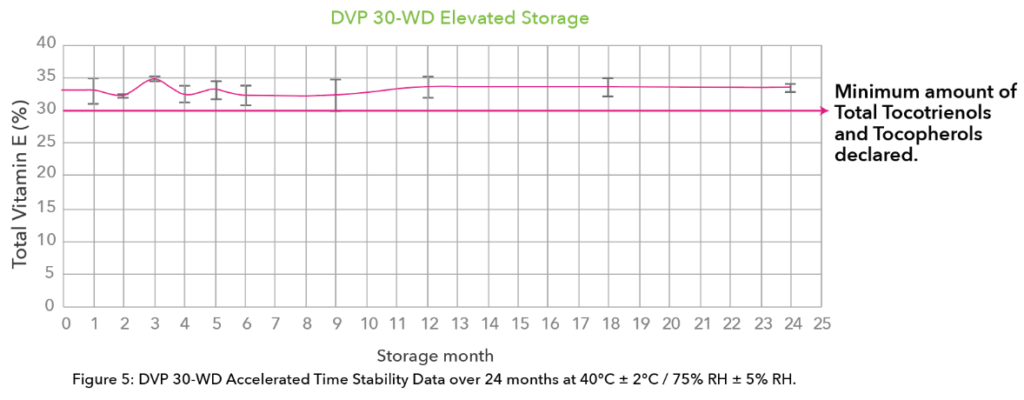Davos Life Science has developed a stable water-dispersible powder of natural Tocotrienols for easy incorporation and dispersion of powder into liquid
Worldwide, populations are ageing. An ageing population has led to an increased awareness about the crucial importance of a healthy diet and lifestyle to enhance health and minimise the risk of chronic diseases. Modern-day consumers are seeking a wider range of food and beverage choices in the market to help them fulfill some of their health and wellness needs. This interest in healthy ageing is driven also by growing healthcare costs as people live longer. Altogether, this has driven interest in functional food and beverages, which are able to provide benefits beyond energy and basic nutrition. Food and beverages are good delivery vehicles for nutraceuticals. The addition of nutraceutical ingredients to food and beverages in sufficient amounts may help to reduce the risk of chronic diseases such as heart disease, cancer, hypertension, and obesity (Augustin and Sanguansri, 2015).
Consumer awareness of these benefits is high. European consumer market reports state that 8 in 10 consumers believe that functional foods can help prevent or delay the onset of heart disease, hypertension, osteoporosis, and type-2 diabetes. The functional food ingredient market in Europe is projected to reach USD 108.7 billion by 2025, with a CAGR of 6.6 % over the forecast period of 2018-2025 (Market Watch, 2020).
Bioactive healthy ageing ingredient for functional food and beverages
DavosLife E3 Tocotrienols (Super Vitamin E) are bioactive ingredients that fit perfectly into these consumer needs. It is a Super Vitamin E derived from nature, with many properties that can help to support healthy ageing. Tocotrienols are potent antioxidants with strong anti-inflammatory properties and numerous research studies have proven its efficacy in promoting cardiovascular health, cognitive function, bone and joint health, skin health and liver health.
As a lipid-soluble vitamin, however, the process of incorporation of Tocotrienols into food and beverages, which are typically aqueous-based, is complex. The non-polar character of Tocotrienols means that it cannot simply be dispersed directly into an aqueous phase as it would rapidly coalesce and separate through gravitational forces, leading to a layer of oil on top of the product (Piorkowski and McClements, 2013). Additionally, if it were to be used directly, it would be susceptible to degradation, and may interact with other components in the food, resulting in loss of bioactivity of the Tocotrienols.
To ensure that Tocotrienols can be easily incorporated into functional food and beverages, Davos Life Science has developed DavosLife E3 DVP 30-WD, a stable and bland-tasting water-dispersible powder format of natural Tocotrienols.
DavosLife E3 DVP 30-WD: Advanced dispersion technology
a) Superior dispersibility
DavosLife E3 DVP 30-WD has superior dispersibility in aqueous systems. It will begin to self-disperse upon addition to aqueous medium (Figure 1), and minimal agitation is required to fully disperse this in an aqueous medium. This has a number of advantages for manufacturers. Firstly, it means that a specialised production facility with a high shear mixer is not needed for successful incorporation of Tocotrienols into the finished product. Secondly, because it disperses easily into the aqueous medium without the need for very vigorous mixing, this in turn means that there is minimal incorporation of air into the final product. This would reduce foaming, oxidation and other stability issues.

b) Forms a uniform and stable dispersion
DVP 30-WD will form a uniform dispersion in aqueous medium upon mixing (Figure 2). A uniform dispersion means that there will be no localised high concentrations of Tocotrinols powder, which will then separate out of solution. Heating is also not required in order to achieve this fine dispersion, and this means that fresh taste, fresh aroma and appearance of the product are preserved.
Once DVP 30-WD has been fully dispersed throughout the aqueous medium, it will remain stably dispersed for up to 48 hours (Figure 3). Under manufacturing conditions, this means that DVP 30-WD will remain stably dispersed in pre-blended compound mixtures throughout the production process.

c) Organoleptic excellence
The organoleptic properties of DVP 30-WD were tested using a Triangle Taste Test (ASTM Standard Test Method for Sensory Analysis — Triangle Test (ASTM E1885) on every day consumer products (e.g. milk, yoghurt, orange juice, carbonated drinks and cultured milk drinks). The triangle taste test results showed that the number of correct judgements for each food or beverage category was below the minimum significant number required (α = 0.05) to conclude that a perceptible difference exists between the samples (Figure 4). Therefore, the addition of DVP 30-WD at GRAS-recommended levels is organoleptically acceptable.

* = Results statistically not significant. Therefore taste profile is unaffected by DVP 30-WD.
d) Excellent stability
Other manufacturing challenges include the need to (1) limit the degradation of Tocotrienols when it is incorporated under conditions used for food processing, and (2) stabilise Tocotrienols during the shelf life of the finished product. Stability studies of DVP 30-WD conducted at elevated storage (40˚C) over 24 months (Figure 5) show that the total Tocotrienols content is very stable. This translates to stability during thermal processing at this temperature, storage, and food preparation.

References
1. Augustin, M.A. and Sanguansri, L. (2015). Challenges and Solutions to Incorporation of Nutraceuticals in Foods. Annual Review of Food Science and Technology, 6(1): 463-477.
2. Piorkowski, D.T., and McClements, D.J. (2014). Beverage emulsions: Recent developments in formulation, production, and applications. Food Hydrocolloids, 42: 5e41


